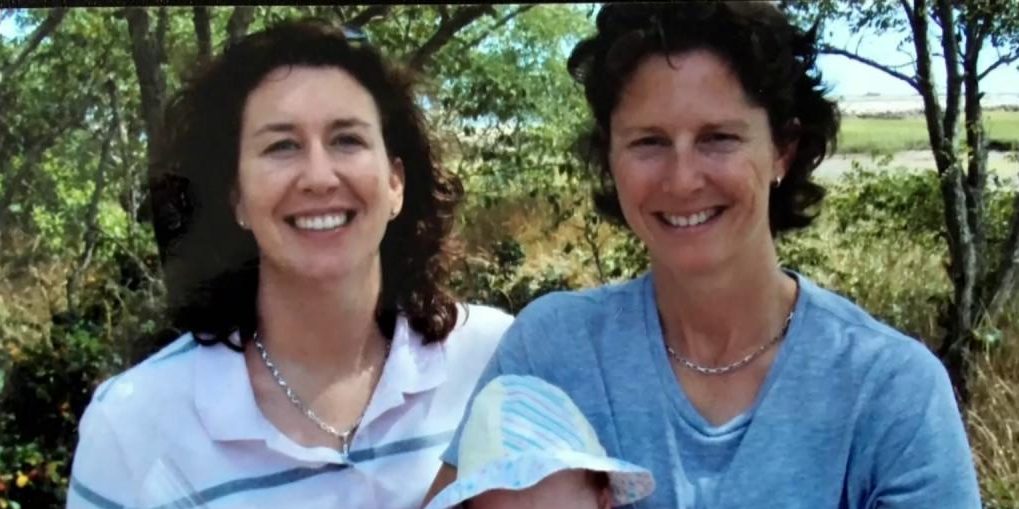The case of Cara Rintala unfolded with the discovery of her wife, Annamarie Cochrane Rintala’s lifeless body in the basement of their house. The initial scene was chaotic, with her grieving and holding the remains. However, a few months later, she found herself being accused and was subsequently found guilty of murder. What followed was an extraordinary legal journey, making Cara one of the very few people in the country to undergo four trials. The twists and turns of this case, the complexities of the legal system, and the quest for justice have all been documented in the NBC ‘Dateline’ episode titled ‘Down the Basement Stairs.’
Who is Cara Rintala?
Cara, a paramedic with the Ludlow Fire Department, and Annamarie, also a paramedic, first crossed paths in 2002, sparking a romantic connection that swiftly led to dating. Choosing to formalize their commitment, they exchanged vows in 2007. Their shared aspiration for parenthood materialized the same year when they welcomed their adopted daughter as a newborn. Despite these joyful moments, their relationship encountered challenges in 2008. In September of that year, Annamarie took legal action, filing a restraining order against Cara, alleging instances of physical aggression. However, by November 2009, the case was dropped.
The tension persisted between Annamarie and Cara in the subsequent months, leading to both individuals filing restraining orders against each other in May 2009. Simultaneously, they sought primary custody of their daughter,, but then opted to withdraw their petition, expressing a commitment to giving their marriage another chance. Attempting to rekindle their bond, they embarked on a family vacation involving a visit to Annamarie’s aunt in Florida, followed by a Caribbean cruise in early 2010. Yet, amidst these efforts, Cara accused Annamarie of engaging in affairs and criticized her for financial irresponsibility, alleging the maxing out of their credit cards.

On March 29, 2010, Cara returned home from her night shift at around 10 a.m. and later departed with her daughter for errands at approximately 3 p.m. Upon returning to the house at 7 p.m., she discovered the basement door ajar and saw Annamarie’s bare feet near the doorway. In a seemingly distressed state, she swiftly took their daughter and their dog to the neighbor’s house, requesting they call 911. When paramedics arrived, they found her in the basement, cradling her wife’s lifeless body, both of them covered in blood and paint. Unfortunately, Annamarie, 37, had already passed away, and the subsequent coroner’s reports indicated that she’d died from strangulation. The reports further revealed marks on her head and body, suggesting the use of blunt force in causing her injuries.
Cara Rintala is in Prison Today
The presence of paint at the crime scene posed a significant challenge for investigators, especially since it compromised potential DNA evidence. Despite these difficulties, law enforcement closely tracked Cara’s activities, noting inconsisten cies. Therefore, on October 19, 2011, Cara was arrested on charges of first-degree murder. During this period, she relocated to Rhode Island with her daughter to be nearer to her family. Authorities asserted her arrest stemmed from indications she’d assaulted and strangled her wife due to escalating stress within their union.
Cara’s defense sought to redirect the focus of prosecutors towards other individuals, such as Annamarie’s male co-worker Mark Oleksak and her ex-girlfriend Daniele. However, both had solid alibis, leading the police to positively eliminate them as suspects. In her initial interview with authorities following the murder, Cara had characterized Annamarie as a “master manipulator,” accusing her of financial misconduct, including misusing Cara’s retirement funds and spending the money saved for their daughter. This was thus deemed as her motive, but her 2013 trial still concluded with a hung jury.

Cara’s second trial in 2014 similarly ended in a hung jury, prolonging the legal proceedings. The third trial commenced in 2016, introducing a new witness, David Guilianelli, a quality engineer from the paint company that manufactured the paint discovered on Annamarie’s body. Guilianelli’s testimony asserted that the paint appeared to have been intentionally poured a few minutes before the arrival of first responders. This revelation convinced the jury, leading to Cara’s conviction for first-degree murder and a life sentence in prison.
But alas, in November 2021, the appeals court reviewed Cara’s case and determined that the engineer’s testimony lacked a foundation in proven methods, raising concerns about its overall reliability. Acknowledging that this testimony potentially influenced the jury’s opinion, the court overturned the initial judgment. Cara was subsequently released on bail and returned to Rhode Island, where she was subject to a court-appointed curfew as well as GPS monitoring, seemingly regaining a semblance of freedom. Despite this development, the District Attorney’s office expressed a willingness to pursue a fourth trial against her.
Cara’s fourth trial commenced in September 2023, leading to a verdict that found the 56-year-old guilty of voluntary manslaughter in the case of her wife, Annamarie Cochrane Rintala’s, death in 2010. The sentencing resulted in a prison term of no less than 12 years and no more than 14 years, with credit for the 7 and a half years she has already spent in custody due to the preceding trials. Therefore, today, with 4½-6½ years left to serve, Cara is currently incarcerated in a Massachusetts State Prison.
Read More: Lonnie Paul Tracey: Where is the Killer Now?


You must be logged in to post a comment.